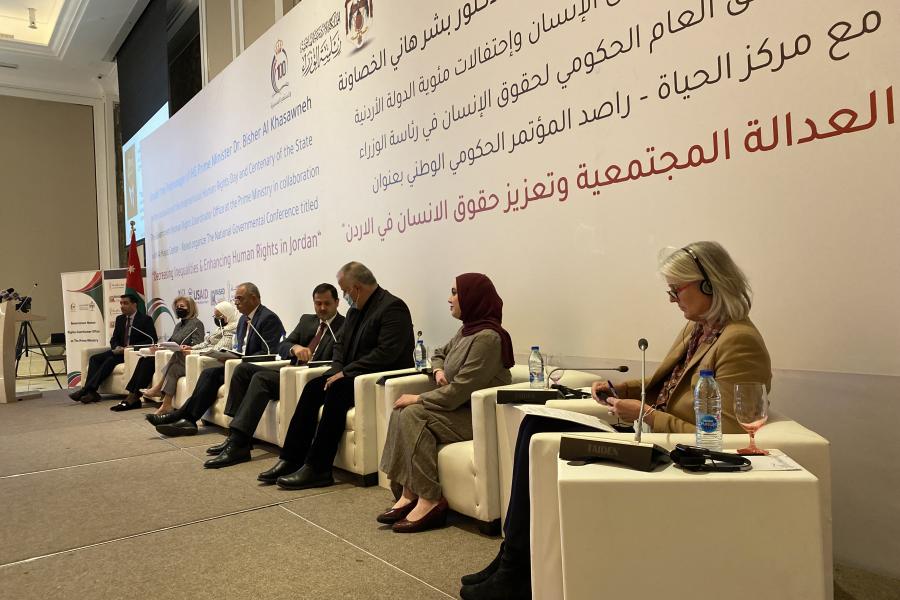Senior Human Rights Advisor to the RC Christina Meinecke on “Human rights in the centenary of the state and the importance of enhancing social justice”
As part of the panel discussed at the National Governmental Conference for Decreasing Inequalities & Enhancing Human Rights in Jordan.

Excellencies,
Distinguished participants,
Ladies and gentleman,
Thank you for inviting me to speak on this panel.
All human, all equal: Rebuild better, fairer, greener.
Rebuilding fairer requires reversing long-standing practices of inequality and poverty and strengthening the implementation of the Sustainable Development Goals. That vision is at the heart of the 2030 Agenda for Sustainable Development, captured in SDG 10: reduce inequality within and between countries. According to the World Inequality Report 2022, the MENA region is the most unequal region in the world where the share of the top 10% of income is around 58%.
Inequalities stem from policy choices. We need to reverse years of under- investment in economic, social and cultural rights, and be bolder in repositioning public expenditure to prioritize people and their rights.
Even in times of crisis, Governments have obligations under international human rights law to mobilise the maximum available resources for social spending on economic, social and cultural rights - including on the rights to health, education, food, health, housing, and water and sanitation, and to meet the minimum essential levels of these rights.
States are required to carve out the necessary fiscal and policy space to invest in public health systems, education, care work, housing, water, sanitation, electricity, infrastructure, environmental protection and digital resources.
Social spending on universal health coverage and social protection schemes have been key to saving lives and livelihoods especially during the pandemic including in Jordan through the National Aid Fund.
The United Nations as one of its forthcoming priorities seeks to support Jordan in promoting green and decent jobs, while safeguarding labour rights and standards. Social protection floors are key to saving lives and livelihoods especially for women workers and those in vulnerable situations including workers in the informal and precarious sectors.
In the Common Agenda set out by the UN Secretary-General in September 2021, he calls for renewed solidarity between peoples and future generations; better management of critical issues involving peace, development, health and our planet; a revitalised multilateralism that can meet the challenges of our times; and a new social contract anchored in human rights.
The new social contract between duty bearers or States and rights holders or the people should prioritise a life of dignity and rights for a majority of human beings on the planet.
Economic and social rights are not ordinary services with a market-set price-tag, but essential factors in building more peaceful and equal societies. And civil and political rights are equally crucial to building inclusive, participative societies.
Together – regardless of the country's wealth or stage of development – steps to uphold these rights and build social justice help to develop stronger economies and create a powerful movement to maintain social cohesion, deepening trust, building hope and preventing instability.
All policy making should also be grounded in meaningful participation, social dialogue, transparency and accountability. Every State needs the broadest possible civic space. This is the core of SDG 16, which is essential to rebuilding public trust.
Last but not least, in line with the promise of the 2030 Agenda to ‘leave no one behind’, greater efforts are required to collect disaggregated data that clearly reveals the situation of the most disadvantaged and discriminated groups. To respond to this challenge, human rights-based approaches to data and statistics will be essential. We cannot fix what we do not see.
Jordan is committed to realize the 2030 Agenda for Sustainable Development and to “leave no one behind” and will report on progress made next summer through its second Voluntary National Review (VNR) report presented at the United Nations in New York.
Data collected, and research and analysis conducted for the VNR will assist in assessing the status of implementation of human rights overall as the 2030 Agenda aims to realize human rights for all while “leaving no one behind”. It can also be useful for preparing the Government report under the United Nations Human Rights Council Universal Periodic Review process in 2023.
Other human rights reports to be prepared by the Government to address racial discrimination, to eliminate discrimination against women, to ensure the rights of persons with disabilities, on civil and political rights and economic, social and cultural rights can also benefit from the collection of such data.
I encourage to leverage synergies in data collection, analysis and knowledge management, inter-institutional coordination and ensuring meaningful participation in all of these different implementation and reporting efforts.
On the occasion of Human Rights Day, the United Nations stands ready to support the implementation of recommendations addressed to Jordan by United Nations human rights mechanisms, which could build a BETTER, FAIRER and GREENER future for all.










